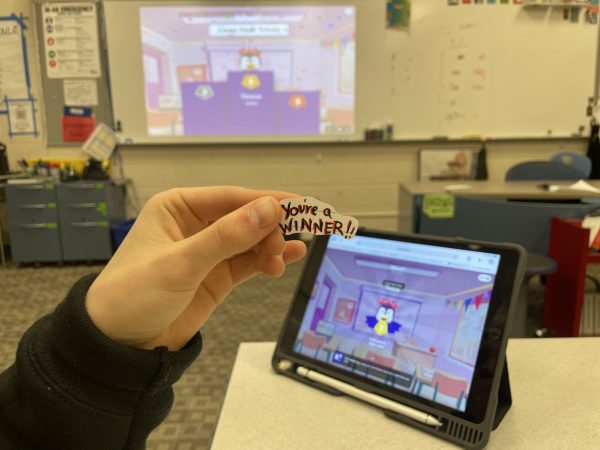World language classes transcend curriculum

Photo by Mackenzie Rough
There are so many electives to choose from, including foreign languages. Carlye Hamilton, Spanish teacher, discusses how important taking a foreign language in high school is.
There are nearly 200 electives that the school offers, but only 3 of them have benefits that truly transcend their content areas: Spanish, French, and German.
When students select their courses, many choose the ones they think colleges want to see. However, the benefits of world language classes go “well beyond the content area, the curriculum, and even the culture,” according to Carlye Hamilton, Spanish teacher. Hamilton says that world language classes teaches students skills that benefit them inside and outside of school.
“Students [who take world language classes] gain an appreciation for other cultures […], their vocabulary improves, which transcends into all different areas of curriculum […], and they also gain confidence in being able to navigate uncomfortable situations,” Hamilton said.
The skills provided by world language classes make it ideal for students to take all four years of a language, especially if the student does not want to go to college or pursue the language in the future, according to Lisa Loeb, French teacher.
“Every college has different requirements, but usually they want to see at least two years, some require more depending on what major you want to go into,” Loeb said. “[…] But even if you don’t go to college, learning the proper speaking and writing skills you learn through [language] classes helps students communicate better with adults.”
Taking world language classes can also allow students place into higher level college courses, according to Loeb. “A lot of colleges offer placement exams, so if you’ve taken four years of Spanish or four years of French [or German], it will be easier to place out of lower level courses than it would be if you only took two or three years of that class,” Loeb said.
While she recommends that all students take four years of language, Hamilton recognizes that students who are not interested in learning new languages or going to college, or may have busy schedules may not “have the time or the desire to take [world language classes].”
However, for students who are wondering whether or not they should continue with world language in future years, “it’s always a good idea to take a third or a fourth year, because even if the college you’re going to doesn’t require it,” Loeb said. “The life and communication skills you acquire by taking [world language classes] are nice to have.”

Going into her senior year, this is Mackenzie’s second and final year on staff and her first year as News Editor. She looks forward to graduating and...










